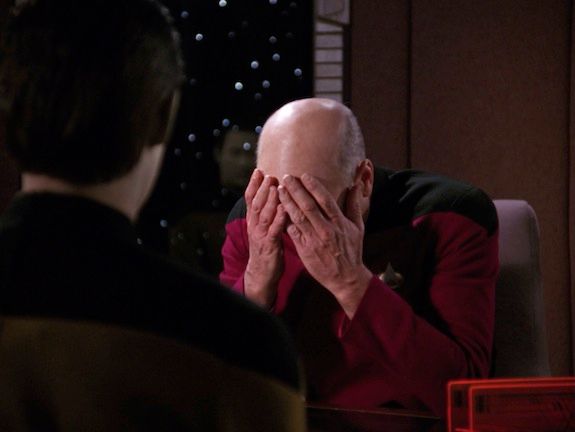truth is, time travel rules depend on the writer
No arguments here. I just can't help but feel when it comes to Yesterday's Enterprise, altering history in the same reality was clearly what these writers were going for. If you listen to the dialogue, everything that transpires in Yesterday's Enterprise is all about altering the history of the reality they're in, not following an already inevitable set path that will lead to the same result whose effects have already been in place. If everything was set in stone, not only would the reality not change, there would be no dilemma in the choice of sending the Enterprise C back in time. There HAS to be a dilemma of choice, especially when your characters are aware that things could be different.
PICARD: Who is to say that this history is any less proper than the other?
GUINAN: I suppose I am.
PICARD: Not good enough, damn it! Not good enough. I will not ask them to die.
GUINAN: Forty billion people have already died. This war's not supposed to be happening.
PICARD: If we send that ship back with new technology we will be altering the past.
RIKER: But that's what you're talking about anyway, isn't it? Altering the past.
PICARD: We're talking about restoring the past.
LAFORGE: How could Guinan know that history has been altered if she's been altered along with the rest of us?
DATA: Perhaps her species has a perception that goes beyond linear time.
PICARD: There are many things about her species we can't easily explained. Yet it is very possible she is correct. A ship from the past has travelled through time. How can we know what effect those events will have on the present. Indeed, we shall never know for certain, if Guinan is correct. But I have decided the consequences of that possibility are too grave to ignore.
If Sela was always in the unvierse before Yesterday's Enterprise, it kind of diminishes these characters making a choice. But when you go by the logic that Sela didn't exist before Yesterday's Enterprise, than choice does matter. Tasha didn't have to go onboard the Enterprise C and everything would have truly been brought back to the way it was, but that's not what happened. She did go back and now things are different. Of course, you could argue that such a huge difference would have affected more things, but bear in mind that these are the Romulans we're talking about here. Take this dialogue from "The Neutral Zone" for instance.
DATA: Since we have had no contact with the Romulans for fifty three years, seven months, eighteen days, we must consider that the information we do have, is out of date.
And how far ahead did the Enterprise C travel?
WESLEY: But that cruiser was destroyed with all hands over twenty years ago.
DATA: Presumed destroyed. The Enterprise C was last seen near the Klingon outpost Narendra Three exactly twenty two years, three months and four days ago.
So since no one in the Federation has made contact, or have even seen the Romulans for over 50 years, you can logically conclude that the Romulan's plan to stay secret was still intact after Sela was born, and it's thanks to Sela that certain events after the Romulans reveal themselves that things transpire as they do. Now this argument could also be used to say she was there the whole time anyways, but I'm still on the "Back to the Future" logic on this one. It makes the choices these characters make matter, and it clearly has a big impact on the series later on that would have been interesting to see if Sela wasn't around at all to begin with.




 I only recently spotted that they renamed it "Lone Pine Mall" - a fantastic bit of detail.
I only recently spotted that they renamed it "Lone Pine Mall" - a fantastic bit of detail.

